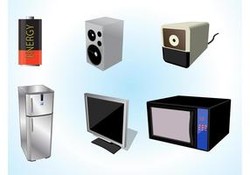
Find Out More
Parents & Educators
Parents should review Elmer's electrical safety tips with their children.
ELECTRICAL FIRE SAFETY
Each year, hundreds of people die and thousands are injured in accidents involving electrical fires. Most of these incidents can be prevented by following simple electrical fire safety rules. Although some of these fires are caused by electrical system failures and appliance defects, many are caused by the misuse and poor maintenance of electrical appliances, incorrectly installed wiring, and overloaded circuits and extension cords.
Electrical Wiring
Most electrical fires result from problems with "fixed wiring," such as faulty electrical outlets and old wiring. Many are caused by cords and plugs, such as extension and appliance cords. Misuse of electric cords, overloading circuits, poor maintenance of cords, and running cords under rugs or in high traffic areas often lead to electrical fires that could have been avoided.
Home Appliances
Next to heating your home, appliances consume the most electricity and sometimes cause electrical fires. Those most often involved are electric stoves and ovens, dryers, central heating units, televisions and radios. Always follow the manufacturer's safety precautions when using an appliance. Many people overlook seemingly-harmless warning signs such as overheating, an unusual smell, short circuits, sparks and sputters. If any of these occur, the appliance should be immediately turned off and unplugged. Contact the manufacturer in order to determine what steps to take next. However, if the appliance functions well, you may have encountered an electrical wiring problem and should contact a certified electrician to check the wiring in your home.
Some Safety Precautions
- Routinely check your electrical appliances and your home wiring.
- Replace all old, worn out, or damaged appliance cords.
- Use electrical extension cords wisely.
- Keep clothes, curtains and other potentially combustible items away from all heaters.
- Never overload extension cords or wall sockets.
The most important fire precaution is to have functioning smoke alarms in your home and to practice a home escape plan frequently with your family.
Fuses and Circuit Breakers
When a fuse blows or a circuit breaker is tripped, find out what caused it to overload before replacing or resetting it. Correct the problem and if you cannot find the source or feel uneasy about the situation, do not hesitate to call an electrician.
Electrical Receptacle Outlets
Have a professional electrician replace old or damaged receptacles with modern, three-wire, polarized receptacles. To minimize fire and shock hazards, proper grounding is essential. Also, make sure that appliance plugs match their receptacles. Never cut off or bend the ground pin of a three-pronged plug as this ground connection protects you from shock caused by a faulty cord or a malfunctioning appliance.
Warning Signs
Many electrical problems can be detected before they cause a fire or harm someone. To better ensure electrical fire safety, learn to be alert and pay attention to any irregular electrical function in your home. Some warning signs include:
- A recurring problem with blowing fuses or tripping circuit breakers;
- Experiencing a tingle when you touch an electrical appliance;
- Discoloration of wall outlets;
- A burning smell or unusual odour coming from an appliance or wiring;
- Flickering lights.
If you notice any of the above warning signs or if an appliance functions oddly, take appropriate measures to prevent an accident. Unplug the malfunctioning appliance immediately. If necessary, cut off power to the problem circuit by disconnecting the fuse or tripping the circuit breaker manually and locate the problem. When in doubt, contact an electrician or call the power company to inspect the electrical connections outside your home. Electrical fire safety is a serious matter and precaution is of utmost importance.


